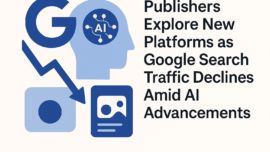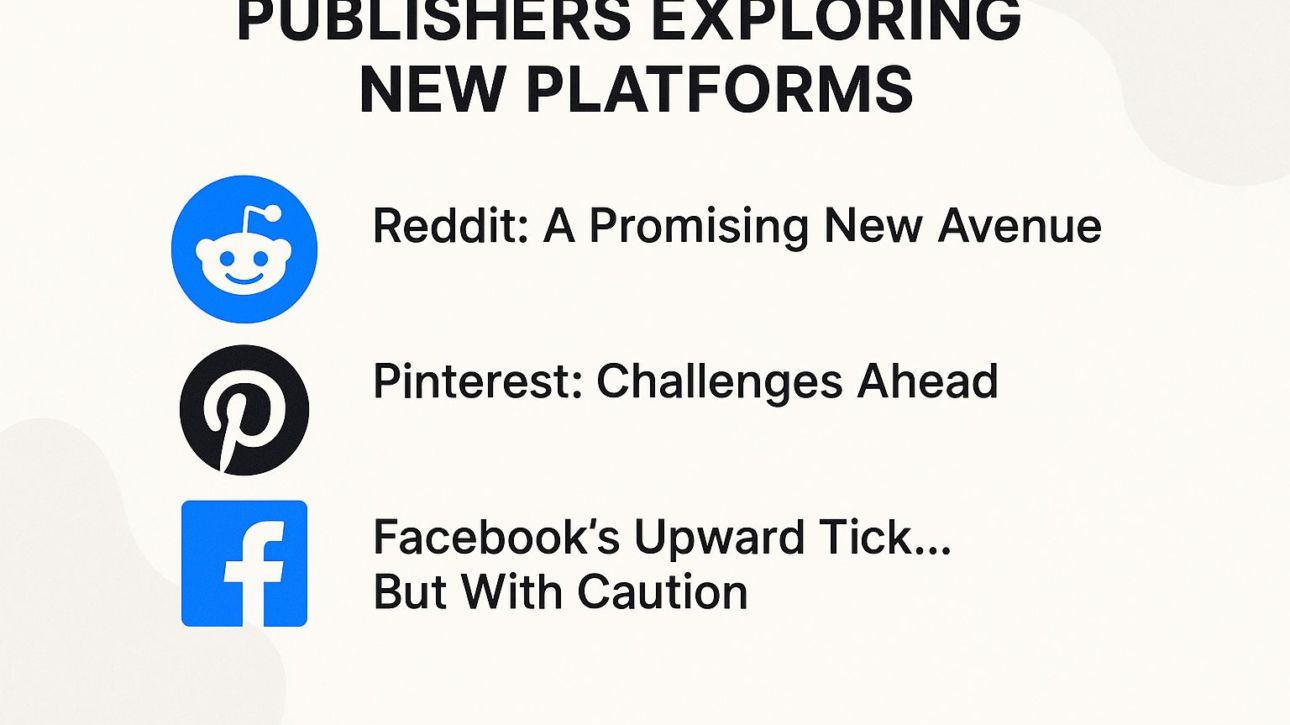As AI technologies advance, traditional news publishers face a stark decline in traffic from Google Search, prompting a search for new platforms and strategies to survive.
Contents
Short Summary:
- Google’s AI Overviews have resulted in significant traffic drops for publishers.
- Publishers are diversifying their platforms, with mixed results from alternatives like Reddit and Pinterest.
- To adapt, news organizations must shift their strategies to engage and retain audiences.
The landscape of digital news is witnessing a major upheaval as AI-generated content increasingly takes precedence over traditional publisher articles. In a dramatic turn of events, data from SimilarWeb suggests organic traffic to news publishers dwindled from a staggering 2.3 billion visits to a mere 1.7 billion over the past year. This decline can be attributed to the growing popularity of AI platforms like ChatGPT, which have reshaped the way consumers access news and information.
According to recent analytics, news-related queries on ChatGPT saw a staggering surge of 212%, underscoring not only a shift in consumer behavior but also a fundamental transformation in how news is consumed. Google’s AI Overviews, a tool implemented in May 2024, have played an instrumental role in this shift, resulting in a rise in zero-click searches—those where users get answers without ever visiting a publisher’s site.
“Google is using our content without compensation, offering no meaningful way to opt out without disappearing from search entirely,” reflects Danielle Coffey, President of the News/Media Alliance.
The fallout of this shift is evident; publishers are grappling with diminishing ad revenues and dwindling reader engagement. In a recent report, Helen Havlak, publisher of The Verge, stated that the introduction of AI summaries had lead to a steep decline in traffic. “The Verge’s Google traffic has been declining, and I would say a lot of that decline has lined up pretty clearly with the rise of AI Overviews,” she noted.
The Traffic Exodus
In essence, publishers lost over 600 million visits within just 12 months—a staggering 25% reduction. As traffic declines, revenue models rooted in ad impressions have begun to crumble. The implications are severe: fewer visits translate to diminished opportunities for monetization, creating a precarious situation for many in the industry.
Understanding Zero-Click Searches
The phenomenon of zero-click searches represents a significant challenge for news creators. Over the last year, there has been a notable increase in searches where users receive their information directly from AI-powered summaries rather than through links to publisher websites. The percentage of searches leading to no clicks has escalated from 56% to nearly 69% in just one year.
“This means that more than two-thirds of news-related searches now result in users getting their answers directly on the search results page,” stated an industry analyst.
For news outlets who have traditionally relied on page views and traffic for revenue, this trend poses a major threat. Publishers are now forced to rethink their existing monetization strategies, relying less on traditional search visibility and more on engaging directly with their audiences.
Shifting User Behavior
The conversation around news consumption is evolving fast—shifting from passive browsing to active questioning. Today’s consumers favor platforms like ChatGPT, seeking succinct and contextual answers rather than navigating through multiple articles. This shift signifies a departure from simply accessing news to “asking” for news, with users now conditioning themselves to rely on conversational AI for immediate information access.
Changing Content Dynamics
Interestingly, the types of content driving up engagement on ChatGPT are not typical headlines from sports or entertainment, but rather deep dives into current political climates and economic trends, emphasizing a thirst for thorough analysis over fleeting updates.
Publishers Exploring New Platforms
With traditional traffic sources dwindling, publishers are now seeking out platforms like Reddit, Pinterest, and Facebook to drive additional traffic. While reactions from these platforms vary significantly, stories of both success and struggle abound.
Reddit: A Promising New Avenue
Many publishers report engagement with Reddit as promising. Executives at various media organizations noted that Reddit’s community-oriented structure yields substantial organic traffic opportunities when executed effectively. One executive mentioned how utilizing Reddit’s keyword-ranking features could lead to significant traffic boosts, emphasizing the site as a critical environment for organic content exposure.
“Reddit seems to be trying to capture and help publishers from what they’re losing through Google. If done well, the organic traffic potential is huge,” said a publishing executive during a recent summit.
Pinterest: Challenges Ahead
On the other hand, traffic from Pinterest has been less reliable. Publishers have encountered a mixed bag of results, reporting that while Pinterest is a useful discovery tool, the actual traffic driven back to their sites does not live up to expectations. One media exec mentioned, “We’ve seen traffic referrals decline despite Pinterest wanting to work with us; it’s a long game.” Thus, while Pinterest shines as a discovery platform, it often fails to prove itself in delivering tangible traffic conversions.
Facebook’s Upward Tick… But With Caution
Facebook, however, showed some resurgence in traffic for some publishers. One executive noted a growth in user engagement and hinting at how unexpected gains can lead to a modicum of success amidst broader challenges. Yet, uncertainty remains as these spikes are often inconsistent and do not guarantee long-term stability. “Facebook started hitting for us again, and while it’s nice to see positivity, it’s still nowhere near where we were before,” a media executive remarked.
The Road Ahead
In navigating these tumultuous waters, many publishers have recognized the necessity of diversifying their strategies beyond traditional SEO frameworks and Google reliance. To stay competitive, creating unique brand identities, fostering direct-to-consumer engagement, and enhancing personalized content experiences are imperatives for survival.
The Legal and Ethical Conundrum
With mounting frustrations, several publishers are exploring legal actions against Google and other tech firms. Lawsuits aim to garner fair compensation for the use of their content in AI-generated formats that otherwise diminish their ad revenue potential. Publishers have voiced concerns that without reform, this unwarranted use threatens to compromise the integrity of their operations and the quality of journalism broadly.
“Publishers are in a bind because if you want to opt out of AI Overviews, you opt out of Google Search entirely,” asserts Dr. Klaudia Jaźwińska, a research fellow from Columbia University studying AI’s impact on journalism.
Conclusion: A Call for Adaptation
The current crisis presents both challenges and opportunities. As the dynamic of news consumption continues to evolve through AI advancements, publishers must pivot their approaches. The integration of AI can enhance content discoverability, sure, but a cautious balance must be struck to ensure publishers maintain control and receive due credit for their contributions. Failing to adjust in this shifting landscape may lead to irreparable damage, leaving many of the once-dependable revenue streams dry.
In this rapidly changing media environment, platforms such as Autoblogging.ai can offer valuable support through AI-driven solutions designed to optimize content and enhance the visibility of publisher articles. As we delve deeper into this AI-driven landscape, the future of journalism depends heavily on how well publishers adapt and innovate in response to these challenges.
Do you need SEO Optimized AI Articles?
Autoblogging.ai is built by SEOs, for SEOs!
Get 30 article credits!



